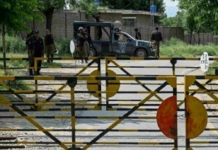The Afghan Taliban is unlikely to expel Tehreek-i-Taliban Pakistan (TTP), despite Islamabad having asked Afghanistan to not let its soil be used as base for terrorist activities in Pakistan, says a Sweden based researcher in the wake of a sharp rise in attacks led by the militant group in the country.
According to media outlet Gandhara, Abdul Sayed, who researches militant groups, has said that the sympathies shared between the two factions has meant that the Afghan Taliban would perhaps never act against the TTP.
Sayed opined that Pakistan could launch attacks against TTP in Afghanistan to protect itself, but that would possibly tarnish the Afghan Taliban’s diplomatic ties with Islamabad. An example of Sayed’s observations was seen in an alleged Pakistani drone strike in Afganistan last month. The drone was allegedly targeted at a senior TTP leader and although it did not explode, the incident saw Afghan Taliban resentful over Pakistan’s actions.
Additionally, the groups brazen activity in Pakistan was likely boosted by having sanctuaries in Afghanistan, noted Abdul Basit, a Pakistani counterterrorism and security expert while talking to Gandhara.
Basit said that the TTP had organizationally changed under the leadership of Noor Wali Mehsud, adding that the group was now more strongly linked to the Al-Qaeda, which has been declared a terrorist network by the US. The group was now more decentralized instead of having an international focus, he added.
Basit said that the shift in perspective and the haven in Afghanistan, had encouraged the TTP to be able to negotiate with Pakistan in a more emboldened fashion.
Other factors that have contributed to a rise in TTP orchestrated attacks in Pakistan include access to modern machinery and the withdrawal of foreign troops from Afghanistan last year in August, as per the media outlet.
On that, a source from Pakistan told Gandhara that the TTP that once used meagre weaponry, now possibly had access to modern ammunition, including US M16 machine guns and M14 assault rifles, adding that this coincided with a rise in sniper attacks by the TTP at night. The weapons were perhaps from the Afghan Taliban’s stockpiles that they gathered after US forces left the country, noted the media agency.
The US departure, on the other hand, has resulted in a reduced counterterrorism capacity and therefore more mobility for the TTP leaders in Afghanistan. Gandhara noted that the diminished frequency of US drone attacks that often neutralized the threat of TTP leaders, also contributed to the rise in TTP attacks.
Regarding the uptick in TTP attacks, the Pakistan Institute for Conflict and Security Studies (PICSS) has found that at least 294 attacks ravaged the country in 2021, of which the highest in a month were 45 as recorded in December the same year.
As per the report, the rise in attacks came about while the Afghan Taliban were rapidly advancing through and reclaiming Afghanistan between May and August 2021.
Gandhara also reported that December, which had the highest number of incidents, marked the end of a month-long ceasefire negotiated between the government and the TTP. The ceasefire came about on November 10, 2021 after weeks of Afghan Taliban mediated talks between the Pakistan military and TTP. The truce fell through after disagreement on terms.
The dampened peace talks and the increasing TTP attacks have reigned in a new wave of terror for Pakistan, which has long been marred by the militant group’s operations, with thousands of lives lost in attacks since 2007.







